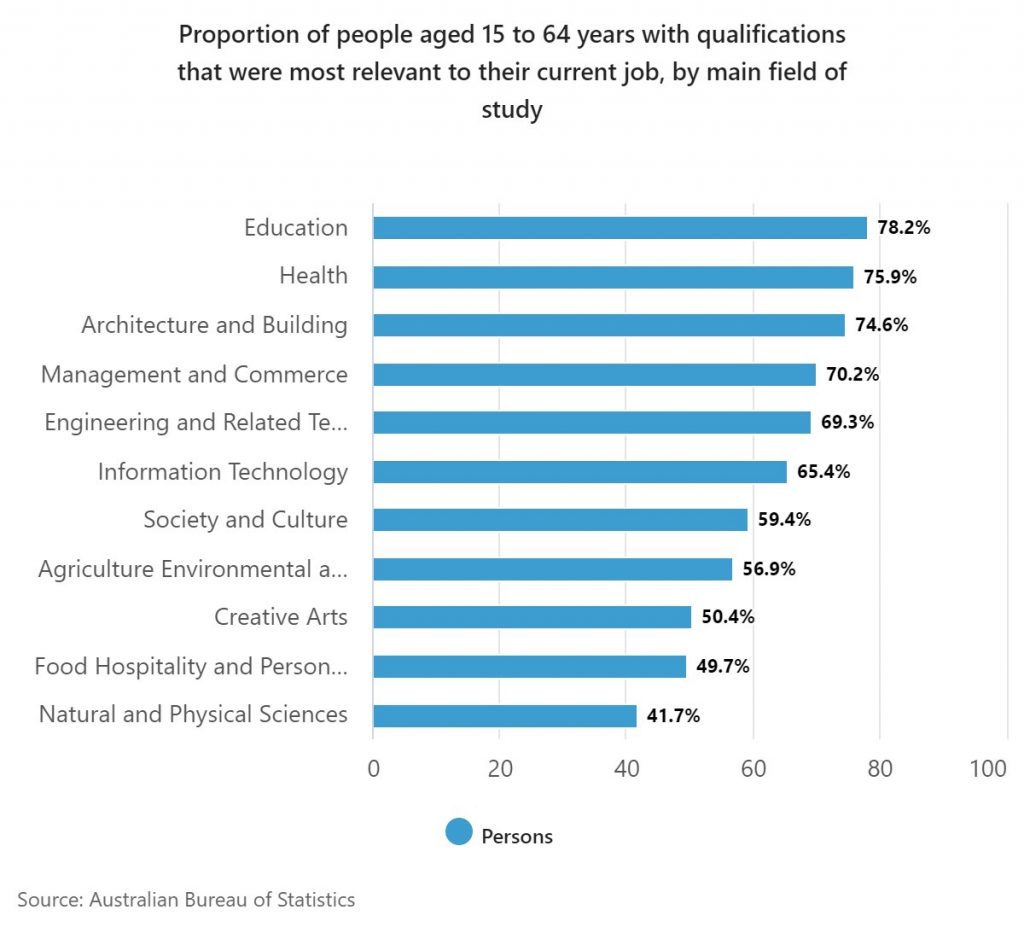Those working in education say qualifications are more closely aligned with their role

People with a qualification in education were the most likely to say it was the most relevant qualification to their job (almost 80 per cent), while those qualified in natural and physical sciences (such as botany, geology and chemistry) were the least likely (just over 40 per cent), a recently released report from the Australian Bureau of Statistics (ABS) has found.
Steven Nicholas, ABS Director of Education and Training Statistics, said the Survey of Qualifications and Work (July 2018 to June 2019) showed the top three qualification fields most relevant to people’s current jobs were education, health, and architecture and building, while natural and physical sciences, food hospitality and personal services, and creative arts were among the least likely to be.

The survey also gave insight into the qualifications people had attained, and their subsequent work. For example, 14 per cent of people with qualifications not relevant to their current job reported being underemployed (that is, they would have preferred and were available to work more hours than they did), compared with 6 per cent of those with relevant qualifications.
“The survey showed that 63 per cent of Australians reported at least one qualification at the certificate, diploma, degree or postgraduate degree level, an increase from 61 per cent in 2015,” Mr Nicholas added.
Of the 24 per cent of Australians holding more than one qualification, women were slightly more likely than men to be qualified in more than one way. Despite this, having qualifications did not translate to income parity – women with one or more qualifications who were employed full-time had lower average weekly personal incomes than their male counterparts. Women with three or more qualifications had average weekly personal incomes similar to full-time working men with one qualification.
The survey also showed that 16 per cent of people had at least one incomplete qualification.
The most common reasons for having an incomplete qualification were no longer being interested in the course (29 per cent), followed by family, health and other personal reasons (24 per cent), and employment or financial reasons (21 per cent).
While there were no real differences by gender for people losing interest in the course, women were more likely to stop studying for family, health or other personal reasons, while men were more likely to stop for employment and financial reasons.
The Survey of Qualifications and Work asked employed people aged 15 to 64 years whether their non-school qualifications (certificates, diplomas and degrees) were relevant to their current job, and which qualification was the most relevant. The reference period for this survey was July 2018 to June 2019 before the impacts of COVID-19.
To access further details, please see the Qualifications and Work, Australia, July 2018 – June 2019 (cat. no. 4235.0) survey, available for free download from the ABS website.
Popular

Workforce
Policy
Quality
Practice
Provider
Research
ECEC must change now, our children can’t wait for another inquiry
2025-07-02 07:47:14
by Fiona Alston

Practice
Provider
Quality
Workforce
Leading with Curiosity: How distributed leadership is redefining the future of early childhood education
2025-07-03 07:42:07
by Contributed Content

Events News
Workforce
Marketplace
Practice
Quality
Provider
Research
An exclusive “Fireside Chat” with ECEC Champion Myra Geddes
2025-07-01 11:25:05
by Fiona Alston













